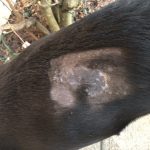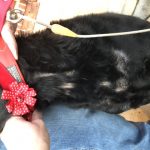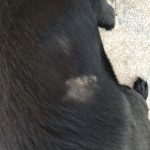Last summer my beloved cat, Summer escaped my home and was missing for two months. When she was found she had lost about 1/3 of her body weight and her personality had changed. While she was previously very much the “alpha” cat and could be a bit of a diva she is now timid and very loving. During the time when she was missing I was under an incredible amount of stress; having a pet pass away is heartbreaking but having a pet go missing is agonizing, I would not wish the experience on my worst enemy. I couldn’t sleep for much of the two months. Our cat Gracie was by my side the entire time. She did take over as the leader of our little cat pack (pride??). When Summer returned Gracie and her initially got along okay, however within about two weeks Gracie started going after Summer causing a significant amount of stress on Summer. She would chase her off the litter box and food bowls. We created a safe space for Summer and over the past year she has very much chosen to stay isolated away from Gracie, our other cats come “visit” without an issue. Several months ago Gracie started urinating outside of her box. We first had to go through the process of elimination to determine which cat was urinating outside the box. All cats have had urine and bloodwork done to rule out any medical issues. Gracie is now isolated and Summer has free reign of the house. Inappropriate urination has stopped. Our other cats can come “visit” Gracie without incident, however as soon as Summer enters the room Gracie attacks her. We have tried medication and we have tried putting a drop of vanilla on each cat so they smell the same. I would prefer to not spend the rest of my cats lives isolating one or the other to create peace in our home. I will note that Gracie has limited or no sight in one of her eyes, she has always been a bit of a “scrapper” with the other pets when they approach her on that side, that being said this isn’t a case of Summer startling her, she is seeking out Summer to attack her.
I would love advice from anyone who has had a similar experience; what worked, what didn’t?
Comments
In June my Labrador developed a lesion on her side. She was treated with antibiotics and a medicated shampoo with no success. Her hair started thinning and she developed a lesion on the opposite side. Bloodwork was run to test for Cushings which was negative. As she started to take a Cushings type appearance her docs followed up with an ultrasound. In October she had a punch biopsy. She was treated with Apoquel with no improvement. She has lesions on her chest, both sides near her hips and one near her hind end. I have never seen her itching or chewing. The lesions are crusty and pretty dense. Hair loss is only on her trunk.
A little history: my dog is 10 1/2, has spay induced incontinence, history of frequent UTI’s, frequent urination, and megaesophagus. She is on Dasuquin, Cranmate and Welactin. Despite her plethora of health issues she has never had skin issues. Typically her coat is blue-black, thick and shiny.
She doesn’t seem to be uncomfortable but she seems to have a pretty high pain threshold.
Thank you for your time.
Comments
A year and a half ago we rescued a 4 week old kitten who presented unresponsive with a body temp so low it did not register. She was revived. As the caretaker was going to put her back out that evening I stepped in and offered to take her with the plan to rehome her. I have rehomed dozens of kittens over the years, all who came from feral colonies. From the get go Annabelle was incredibly sick and had behaviors that weren’t what we were used to. When held she would attack faces, when stimulated she would attack, we continued to work with her and a year and a half later she lays with us at night and as long as we don’t touch her does not attack people. Instead she attacks items. This occurs whenever there is any stimulation in our home, folding laundry, cleaning out a closet, dogs playing, children laughing, the list goes on and on. She has destroyed a sofa, armchair, curtains, tablecloths, comforters, sheets, duvet covers, etc, etc. We can not trim her nails….because we can’t handle her and truly even with her nails trimmed I am sure she would rip things apart with her teeth. We are no stranger to ferals, I am happy to allow them to hide until they feel comfortable, there is no hiding with Annabelle instead she literally runs into the chaos. When we let our dogs out and at feeding time out she runs into the chaos, when I vacuum she runs around the room, when we have company she runs around as I warn our guests not to touch her. We are no stranger to keeping cats happy, we have cat towers, scratching posts, scratching boards, elevated areas, areas to hide. Our other 4 cats are incredibly happy members of our family. I am at my whits end, I honestly feel like we attempted to tame a raccoon and are living with it in our house. I do wonder if Annabelle would be happier outside, but with no sense of danger and a habit of running into the chaos I can’t help but worry she would get killed….and I didn’t save her to have that happen.
I am open to suggestions and curious if anyone has ever had a similar experience.
Comments
Today after running errands I came home to find my 7yo Shepherd Mix cowering in the corner. Typically he runs to greet us. I made sure he hadn’t gotten into anything then I let him out while unloading groceries, typically he enjoys running around the farm but today he hopped into the back of my SUV and refused to budge. As my truck was in a shady spot I let him be with the hatch and windows open while I mowed. Now several hours later he is still in the back of my truck. He has been offered water which he drank and we let his Golden Retriever best bud out who he was happy to see but still refused to budge. Typically he is a “Velcro” dog and stays right with us, especially my daughter. This behavior is very out of character and has me concerned .
Comments
I rescued a young Golden Retriever in May. She had spent the start of her life abandoned in a small cage, she was emaciated, covered in fleas and ticks and of course living in her own waste. She is a wonderful dog, everything is new and she has very much been a blank slate. She is well exercised, is very social with our other dogs and has successfully completed a basic obedience class and will be moving on to 2nd level training and beyond. Thankfully she does not hold her rough start in life against humans in the least. Her only downfall is that she eats stool from our other dogs in the yard. We keep the yard clean, however we have 5 dogs. Even cleaning the yard daily is likely to leave a pile. She will even wait for our smaller dog to go to eliminate so she can eat it as fresh as possible. I imagine that she probably ate her own feces when she was starving, I am quite sure that this is a learned behavior. Over the course of 5 years my family has fostered 80+ dogs. I know that this is a very hard habit to break, however “poop kisses” are rather disgusting so I would love some input on what has worked for others! Thank you in advance.
Comments
Last Christmas our kitty snacked on our live Christmas tree. We found the needles in her stool. This also coincided with her being diagnosed with lymphoma. She is amazingly still with us, although life seems to be a series of ups and downs. As she has has digestive issues from lymphoma I certainly don’t want to cause any further irritation this holiday season. We are debating putting up an artificial vs real tree, however I wonder if ingesting the artificial matter (ie plastic) could be more iritating than organic matter. Thoughts?
If we had a room to simply close the tree in to we would, however we have an open floor plan….and if we didn’t have children we would skip the tree altogether!
Comments
I had run out my house leaving butter on my counter to thaw. I arrived home to find 2 large piles of what I assumed was bile. While cleaning it up I realized it was in fact butter, to my horror my dog had consumed 3 sticks of butter. I have a call in to my vet but would love to know how bad this is to ease my mind. My boy is a Border Collie/GSD mix, 80lbs, 4 years and in good overall health, aside from vomiting he seems to be his normal self. (And yes, I know better than to leave anything on the counter.) Thank you!
Comments
This puppy is the last of a large litter, he was one of the only ones who would keep a clean crate/puppy pen. When the ground froze he discovered the practice of eating poo when he was outside in our fenced in yard. He was neutered a week and a half ago and we thought it would be an opportune time to remedy the poo eating issue since we had to leash walk him. He now refuses to poo outside, we do take him out every 1-2 hours and give a high value treat for pottying outside. He will go in his crate immediately after coming in and will immediately eat it. It almost seems that since I won’t allow him to eat what is in the yard he is just going to make his own snack. I will add that he is a very quick learner, he learned sit and down in an evening. He is very driven by treats and praise. He will urinate outside and looks to me for a treat and praise as he is going. He does not like to be in a messy crate, we know almost the moment it is soiled as he barks/whines and we clean it up. He will only poo in his crate, I do tether housetraining pups to me to eliminate the possibility of accidents (I try to set them up for success) and he has not accidents in the house. He will poo in his crate once I have exited the room where his crate is. I of course can smell the moment he goes, I run in the room and catch him eating it. I have gone as far as letting him out to potty in a pen thinking maybe he does not want to potty with an audience, I watch from a nearby slider but have only “caught” him pooing outside twice in a week and a half, both times I was able to deliver praise and a high value treat as soon as he was done. Lastly his crate is appropriately sized for him, it is a wire folding style crate that is just tall enough for him, he has enough room to lay, stretch out and turn around. This is something I would like to rectify as I know it will be a potential problem in a forever home.
Comments
-
Anonymous Your puppy is just being a ……puppy! Sometimes the art of pet parenting is like the TV show Survivor–Outwit, Outsmart, Outlast.
Be diligent in cleaning up after your puppy poo’s. Do not give him the chance to play with or eat poo. Try placing the puppy on a leash when you take him outside to relieve himself, and do not allow him to inspect his poo. Distract him from by calling him to you, and when he responds appropriately, reward him with a treat and verbal encouragement (go crazy and act like he is the BEST PUPPY ON THE PLANET!) and then take him inside before you go back to pick it up.
If he hates poo’ing on the leash this is where the “Outlast” portion of the program comes into play. You just have to wander around the yard with him until he does it.
Some have found that adding meat tenderizer or natural additives to the puppy’s food makes a big difference, since these additives cause the stool to have a particularly unappealing smell that will discourage him from eating it. If you cannot immediately clean up the stool, or if there are some old stool piles in your yard, you can spray it with hot pepper sauce or mouth wash. It is more effective to just clean up after the puppy.
A good resource for puppy training is The Complete Idiots Guide to Dog Training. You can check it out of your local library. Good luck!!
-
PK Dennis Walking helps the bowels move. How about taking him on a walk when he comes out of his crate, and after he eats his meals. The walking will get him eliminating and you will have him on a leash to control his movements while you pick up the poop. This may work faster/better than turning him out in the yard and waiting, or wandering around the yard while he decides if he is going to poop or not.
It may also be so exciting to be out and about that he forgets he wants to poop inside where he can snack.
Good luck!
-
Anonymous There are products out there to make the poo taste bad and most of them (I believe) have the main ingredient of MSG, which is the same thing as meat tenderizer. Dr. Foster and Smith has a product called Dis-Taste, but I’m sure there are others. If a dose of MSG isn’t harmful, give it a shot!
-
Brian Downie Hello Jennifer. My Great Dane did this and then my Golden Retriever starting doing it. Learned behavior? I agree with Dr. Mag’s suggestions. I taught the leave it command and do not leave them unattended when it is ‘potty time.’ I tried to read a lot of remedies for this issue. What I found was mixed reviews on the food additives to deter the poop eating. I read about nutritional deficits and remedies. What I read and think was going on with mine was most dogs like to keep their play and living areas clean. Sometimes when a mother has a new litter, she will demonstrate this issue to keep the area clean for her pups. I too have a fenced in back yard which doubles as their play area when I cannot take them out in the unfenced area. I taught the leave it command and keep the area clean of feces. Somehow, imo, your dog has associated the crate pooping as safe but then cleans the area since it is his ‘safe spot.’ It took a few weeks to dissuade my dogs from doing this. Still, if I am not diligent about watching over them and keeping the area clean, the issue will persist. Your reaction whether positive or negative outside, may be influencing what the dog believes to be ok so he returns to his ‘safe’ area and only poops when he thinks you are not paying attention (because of your reactoin?) then gobbles the tasty morsel up for maybe cleaning? I found with my dogs when there is an unwanted behavior/issue the best reaction is no reaction. Remember, running to the crate to stop him may be interpreted as him doing something wrong so he tries to ‘destroy’ the evidence. It is learned somehow.
An anecdote. My very sensitive Great Dane when she was young had what I perceived to be separation anxiety when my wife and I would leave. We would come home and rugs would be chewed, pillows destroyed, etc. I would come in and immediately react, negatively. I posted on here and in short, the response was it was my fault. I was at first offended thinking I was a great doggy parent, but then I thought about it. My Dane associated our leaving with her getting negatively in trouble when we came home. This caused her great stress and her acting out was a reaction to fear and anticipation. I quickly changed my behavior. When I came home I would simply clean up what was destroyed and before leaving I would remove anything I could. I did not react. She would cower in her chair while I cleaned. I simply went about my business without noticing her. When I was done, once she came out of her chair, I acknowledged her and said hello. It was my responsibility to break the association, not the behavior. It took a little time, but we became successful. Now when we leave, we make it no big deal. When we come home, it is not a big deal. She isn’t afraid of us leaving and her ‘just’ getting in trouble when we come home. We no longer come home to destroyed items or a fearful dog. I personified her hiding in her chair with her knowing she did something wrong. Nope. I taught her that when we come home I would yell at her so she anticipated that with great stress and fear.
Maybe, without knowing it, we teach our dogs to do negative things. The hard part is realizing and accepting it then correcting OUR behavior.
Good Luck!!!
-
Brian Downie ” The issue of eliminating in his crate began AFTER I restricted him from eating poo outside.” Maybe he learned it is not ok to poop outside?









Hi there. I’m sorry it took us a while to respond…I’ve been pondering over this since you initially posted. I think you may have to consider permanent separation. This is doable in a cat household, as you’ve seen, though it can be annoying, but it might be safest for the clowder.
I assume you’ve tried Feliway?